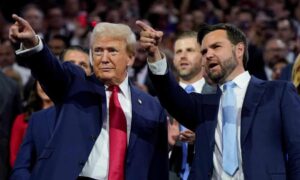
Opinion polls conducted since the weekend suggest Donald Trump’s narrow escape from the attempt on his life in Pennsylvania has made his return to the White House more likely. Until now, little attention has been paid to what Trump 2.0 would mean for the US and wider global economy. That will now change.
What the world needs is a period of stability after the repeated blows of recent years. Were Trump to avenge his 2020 defeat at Joe Biden’s hands come November, it would mean the opposite.
Sure, there are other reasons for being anxious about a second Trump presidency, but anybody wondering what the next big economic shock might be after the pandemic and the war in Ukraine need look no further than the frontrunner to be in charge of the world’s biggest economy in six months’ time.
In its latest health check on the global economy on Tuesday, the IMF highlighted the risks of big swings in economic policy as a result of elections this year. It did not mention the US by name but the implication was clear enough. Unaffordable tax cuts could lead to bigger debt problems, push up long-term interest rates and ratchet up protectionism.
The IMF said: “Trade tariffs, alongside a scaling up of industrial policies worldwide, can generate damaging cross-border spillovers, as well as trigger retaliation, resulting in a costly race to the bottom.”
Trump’s economic strategy is highly protectionist, it is also incoherent and dangerous. It is incoherent because he appears to think the tariffs he intends to impose on goods entering the US from China (and other countries) will pay for cuts in income tax. In reality, tariffs mean higher prices for US consumers, which will hurt those on low and middle incomes the most. The tax cuts will mostly benefit corporations and better-off individuals.
It is dangerous in a number of ways. For a start, there is the risk of prompting a full-blown trade war with China. Then there is the threat that higher prices for imports will drive up US inflation, leading to higher interest rates. Tough curbs on immigration are promised, and these will have the effect of reducing labour supply and adding to the upward pressure on wages.
